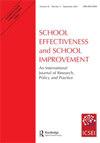学校和课堂气氛对数学考试成绩的影响:一个三级分析
IF 2.8
3区 教育学
Q1 EDUCATION & EDUCATIONAL RESEARCH
引用次数: 5
摘要
支持性的学校和课堂氛围可以增加学生的成绩,并弥补低社会经济地位(SES)对学业成绩的负面贡献。我们测试了学校和课堂气氛对智利学生数学考试成绩的额外贡献。我们对151,015名八年级学生(参加5,619所学校的8,412个教室)进行了二次分析,这些学生完成了智利的Sistema de Medición de la Calidad de la Educación (SIMCE)测试。我们确定了学校气候的六个维度,并将其汇总到课堂和学校层面,以拟合三级回归模型。学生性别(女生)和低社会经济地位是考试成绩的主要负向预测因子。学校和课堂气氛对考试成绩的差异也有额外的影响。积极的学校和课堂氛围弥补了性别和低社会经济地位对学生数学成绩的不利影响,这证明投入资源促进积极的学校和课堂氛围是合理的。本文章由计算机程序翻译,如有差异,请以英文原文为准。
The contributions of school and classroom climate to mathematics test scores: a three-level analysis
ABSTRACT Supportive school and classroom climates can add to student achievement and compensate for the negative contribution of low-socioeconomic status (SES) to academic achievement. We tested the added contribution of school and classroom climate to Chilean students’ mathematics test scores. We performed a secondary analysis of 151,015 eighth-grade students (attending 8,412 classrooms in 5,619 schools) who completed the Sistema de Medición de la Calidad de la Educación (SIMCE) test in Chile. We identified six dimensions of school climate, which we aggregated to the classroom and school level to fit three-level regression models. Students’ gender (girls) and low SES were major negative predictors of test scores. School and classroom climate made an additional contribution to the explained variance in test scores. A positive school and classroom climate compensates for the detrimental effects of gender and low SES on students’ mathematics achievement, which justifies investing resources to promote positive school and classroom climates.
求助全文
通过发布文献求助,成功后即可免费获取论文全文。
去求助
来源期刊

School Effectiveness and School Improvement
EDUCATION & EDUCATIONAL RESEARCH-
CiteScore
6.60
自引率
0.00%
发文量
23
期刊介绍:
School Effectiveness and School Improvement presents information on educational effectiveness, practice and policy-making across primary, secondary and higher education. The Editors believe that the educational progress of all students, regardless of family background and economic status, is the key indicator of effectiveness and improvement in schools. The journal strives to explore this idea with manuscripts that cover a range of subjects within the area of educational effectiveness at the classroom, school or system level, including, but not limited to: •Effective pedagogy •Classroom climate •School ethos and leadership •School improvement and reform programmes •Systemwide policy and reform
 求助内容:
求助内容: 应助结果提醒方式:
应助结果提醒方式:


